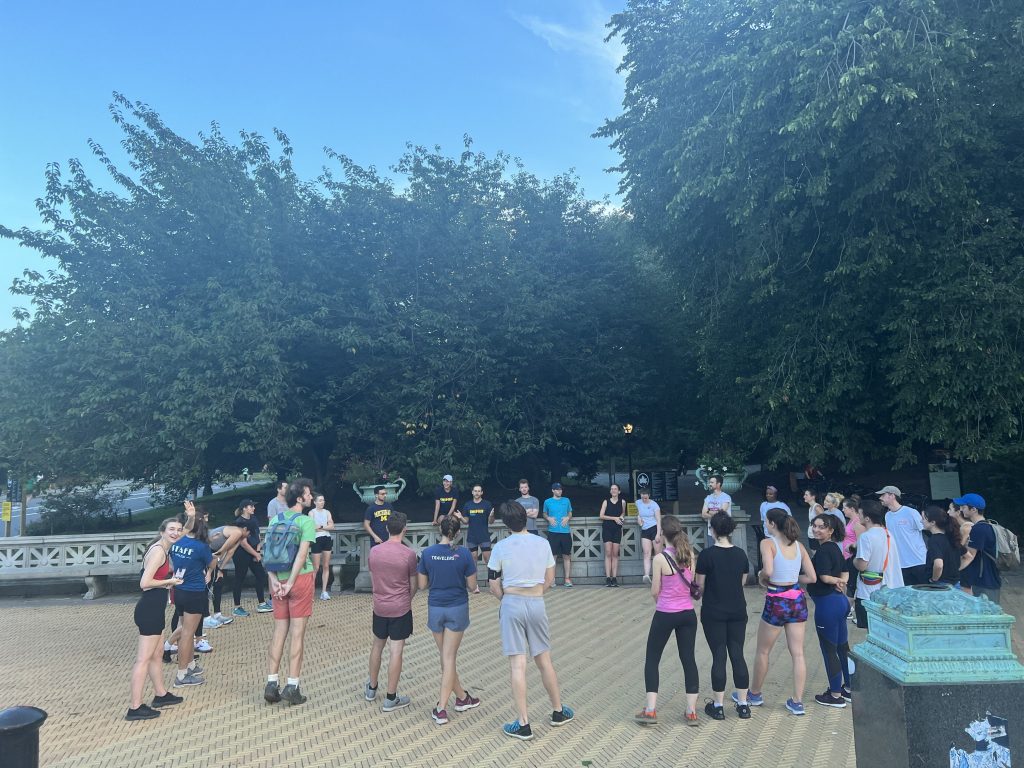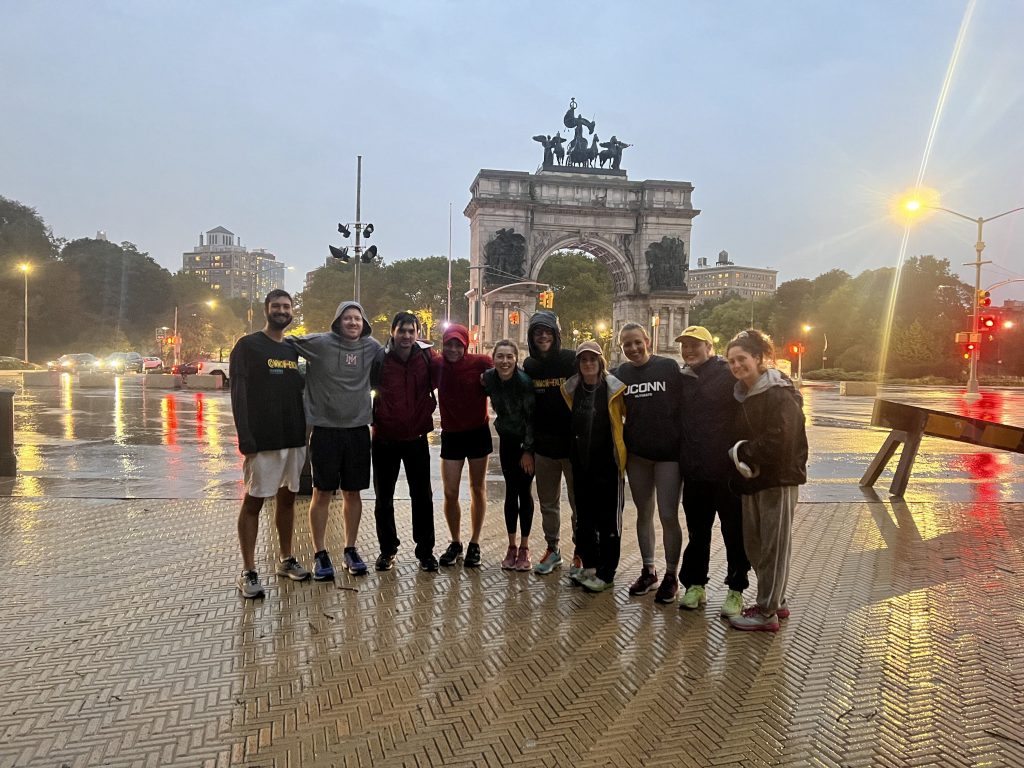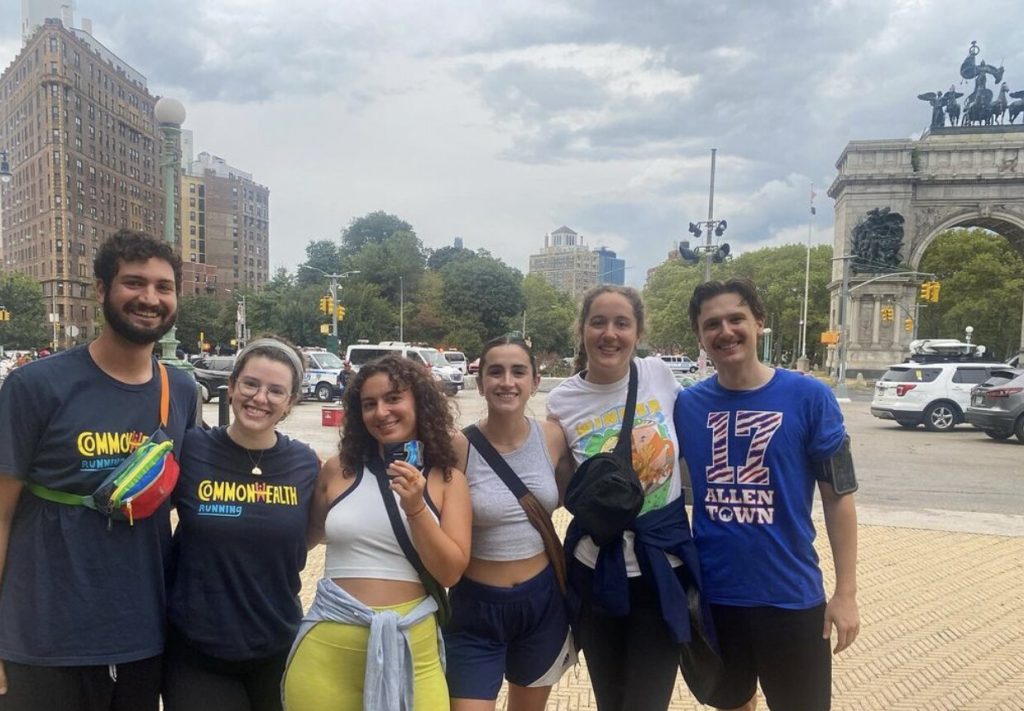
I was waiting for a friend at the entrance of Prospect Park last Wednesday, under a feverish and melting orange sky. Behind me, a circle of about twenty people, all ages and shades, were half-heartedly stretching. They were gearing up to run, but before they set out, their presumed leader, a woman with poised posture, quieted lingering murmurs from the group. “We are going to share our name and our pace,” she directed, “and then we’ll get going.” And they were off, in foot-pattering unison, with the wet leaves of autumn sticking to their soles, shrinking from the portrait at Grand Army Plaza.
At the beginning of 2020, I joined the same club I saw last Wednesday: The Prospect Park Track Club. As someone who prefers to run by himself, I’d avoided running clubs up until then. But I was recovering from running-related injuries, and I was looking for some extra motivation. If you are someone who is currently contemplating the same decision, you’ll probably end up on the NYC RUNS website, a nonprofit that organizes running events all over the city and keeps a catalog of active running clubs in each of the five boroughs. Or, you’ll look on Instagram. In either instance, you’ll be unable to overlook Prospect Park Track Club. They have over 1000 paying members, a vibrant social media presence, impressive apparel partnerships, and most notably, meetups four times a week. They have coaches, time trials, marathon support, and guest speakers. All for only $25 a year.
I went to six group runs over the course of six weeks. Each time, I met friendly folks, but never the same person twice. Afterwards, people checked their pace, logged it on their fitness watches, and went their separate ways. It was the harshest part of winter during those sessions, and no one was looking to linger. Fair enough – and if the pandemic hadn’t struck soon afterwards, I’m sure I would have found a rhythm and a sense that I belonged. But I didn’t get the chance. I went back to solo running at the beginning of Covid, and then accepted a job teaching high school English in New Orleans.
In New Orleans, I was a stranger to everyone. To boot, the city was not its vibrant, gregarious self. In the midst of a pandemic, it was a pouting city, like a toddler in the wake of a tantrum, sulking in the corner. In order to meet people, I sought out running clubs.
The first club I joined, called The 504th, was a socially conscious and diverse group of runners. Each meetup was in a different neighborhood, and a resident of that neighborhood would lead the pack of usually sixty people, pointing out things they thought the group should know. The leaders of the group were entertaining and inclusive, but often preachy and didactic. They ran slowly, and as a pack. If I wanted the freedom to occasionally push it, this was not the group to do so.
The second group I joined, the Power Milers, met twice a week: on Thursday evenings at the track, where they ran with the tenacity of prize-winning greyhounds, and again, punishingly early on Sunday mornings, at god-knows-where because I never showed up. In my first and last appearance with the group, members asked about my experience, my personal bests, and maybe even my ancestral roots. I can’t totally remember. Anyway, I joined their second heat of runners,assuming I could keep up. I finished with their fourth heat and was too winded to have held a conversation – not that anyone was looking to chat anyway.
I joined the third group after moving out of the French Quarter. My new apartment was next to a running store that hosted a run every Monday night at 6:30. Goldy Locks. I knew right away. The tone. The size. The intrigued looks I received just by being a new face. It was all so casual. They gave everyone three options, 3 miles, 5 miles. 7 miles. Show up at the bar when you’re finished. Meet people, have a good time, and move your body. Those seemed to be the unwritten rules, and for me it was exactly what I didn’t know I was looking for.
When the school year was up, I decided to move back to New York, mainly to be closer to friends and family. Of my transition back to Brooklyn, no longer attending the Louisiana Running + Walking Club was the hardest part. It only took three weeks into being back until I figured I’d try to recreate something similar.
It didn’t take off at first. When I first advertised the club last October, only my brother and roommate showed up. A total failure. A week later I found out I needed a cartilage transplant for my right knee and postponed the idea of starting a new running club all together.
During the eight months of recovery, I had time to cultivate a more vivid picture of what I wanted a run club to look like. More importantly, I spent those months getting situated in Brooklyn, widening my circle of friends and neighbors. By the time summer arrived and I was once again ambulatory, I had a much greater sense of what people were craving and how to provide it.

The first thing was that most people I talked to had no interest in running. Not a problem. Just walk. For too long, run clubs have alienated those willing to move, but not run. Currently, we have as many walkers as we do runners. If one day a walker wants to start running, great. If not, that’s fine. And say a self-identified runner is seeking some casual companionship but is sore from an active weekend, they’ll walk. There truly is no premium on speed. The important thing is that you have some place that is not work or your apartment to let loose, and meet people who live around the corner. I think most people do not have this space in their life.
Creating a space where people feel no inferiority walking may be our special ingredient, but it is our commitment to “the hang” that will keep the club growing. Most people who show up will run or walk for thirty minutes but they’ll hang out at the bar we partner with for an hour or two. We’ll drink, play trivia, put strangers on the hot seat, make plans with a new friend, and most notably, remember your name. The people who show up are open to the idea of meeting and making friends. There are no cliques, not because it is a rule, but because it seems to be understood that life is more exciting when we know more of our neighbors.
Finding the right sponsor was the last crucial piece in creating a space that prioritized community before personal progress. Such a disposition towards the world speaks to the symmetry between the club and the bar we partnered with, Commonwealth. When I first asked the owner, Ray, if he’d be open to hosting a run club at his bar, under the agreement for a discount on drinks, he was fervently casual in his willingness. If you have been to
Commonwealth Bar before, this probably doesn’t surprise you. On the bar’s website it reads on the homepage:
Commonwealth is a pretty decent bar at the corner of 5th Ave. and 12 St. in Park Slope, Brooklyn. We’re open every day until 4 a.m. There’s lots of booze, a spacious patio, a famous jukebox, and a great pinball machine. We also have a giant umbrella, and our regulars don’t suck.

